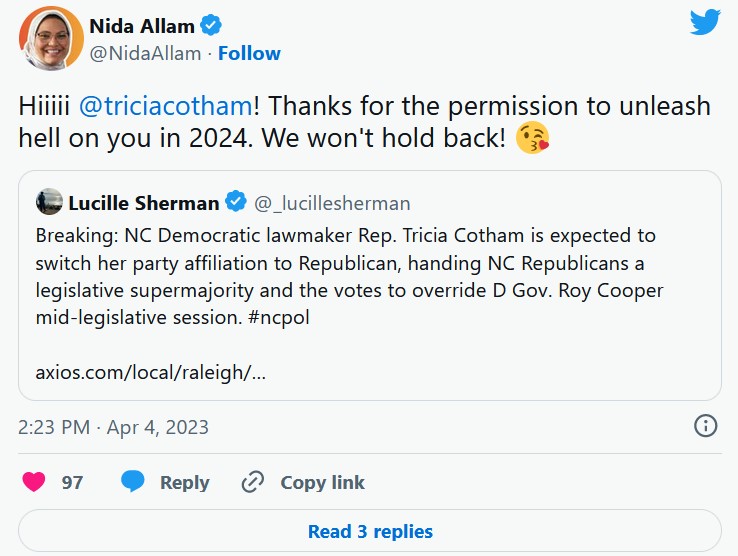A tectonic shift in N.C. politics happened this week as Mecklenburg County Democrat state House Rep. Tricia Cotham announced that she was switching parties and becoming a Republican. In other years, this might not be such a huge deal. But with a supermajority in the state Senate for Republicans and a state House that was one vote shy, her decision cripples Democrat Gov. Roy Cooper’s veto power, ultimately making him a lame duck.
The term already applied to all the Democrat legislators who refuse to work across the aisle and vilify those who do.
These lame ducks did not take Cotham’s news well. In fact, they seemed to start down the normal course of human emotions when experiencing tragedy: the stages of grief — denial, anger, bargaining, depression, acceptance.
Stage 1: Denial
First, the denial, which started well before the announcement. Republican consultant Jim Blaine had said right after the election that as many as three Democrats were considering switching parties. Carolina Forward, a progressive activist group that is very progressive and active on Twitter, mocked that idea, saying anyone who believes this might be a good customer for beachfront property in the mountains of Swain County.
Well, the impossible happened, and some beachfront property in the mountains of Swain County even emerged.
Stage 2: Anger
Once the truth sets in, often people experience anger — which might start as irritation and grow into a boiling rage. Most on Twitter have long ago set aside self-control and nuanced feeling, so naturally they went straight to Level 10 fury.
They brought up her gender, her race, her faith, her family, and everything else as they piled on. They spread baseless rumors that she was switching because of some payoff, or even because she was having a secret romantic relationship with Speaker Tim Moore, which both Cotham and Moore’s office have denied.
Here is just a taste of the avalanche of hate that poured out after the announcement:

Stage 3: Bargaining
After the anger, the natural inclination is to attempt to bargain with reality. In this case, Democrats attempted to do this by suggesting things like suing Cotham for lying during her campaign or investigating her for potential payoffs, both of which would obviously go nowhere.
But what they quickly consolidated around was to bargain with Cotham directly by demanding that she resign. This would, conveniently, make the whole problem simply go away. Maybe she’ll just, like, change her mind if we just call her office enough, harass her whenever she goes in public, and write strongly worded statements.
Seeing as those were some of the very things that she says pushed her out of the party, it’s unlikely that she will take her former compatriots up on this offer to resign. But Democrats held a press conference demanding it, released many statements, and seem to be leaning into the “why don’t you just resign instead?” message.
But many other voices, even from within the Democratic Party, said, maybe all this bullying is part of why Cotham left. Speaker Moore even said during the Republican press conference that there were more Democrats he was in talks with that were considering a switch for similar reasons.
One of the Democrats suspected of being on that list, Rep. Cecil Brockman, who is currently being attacked by his county party for missing a vote on gun control, told the Raleigh News & Observer that the Democrats “put themselves in this position.”
Former state Sen. Joel Ford, another Democrat from Mecklenburg who was bullied out of the party for independent thinking, simply said, “I understand,” in response to Cotham’s decision.
Stage 4: Depression
In their newfound state of complete lame-duckedness, the North Carolina Democratic Power looks like it will remain in the anger and bargaining stages for the moment. But once they realize that this reality cannot be changed by their aggressive tweets and their calls to resign, the lack of access to power in the state will lead some to feelings of helplessness, which is Stage 4: Depression.
But this state is not one that needs to be permanent. It offers a choice to eventually reach the last stage, acceptance of reality as it is. This healthy step would enable them to contribute to the governance of the state, by working with those across the aisle, in a way that other Democrats — like Cotham, Brockman, and Ford — have shown is possible.